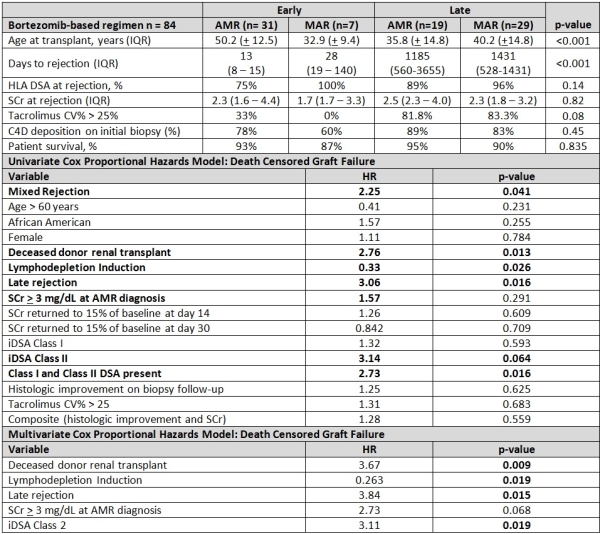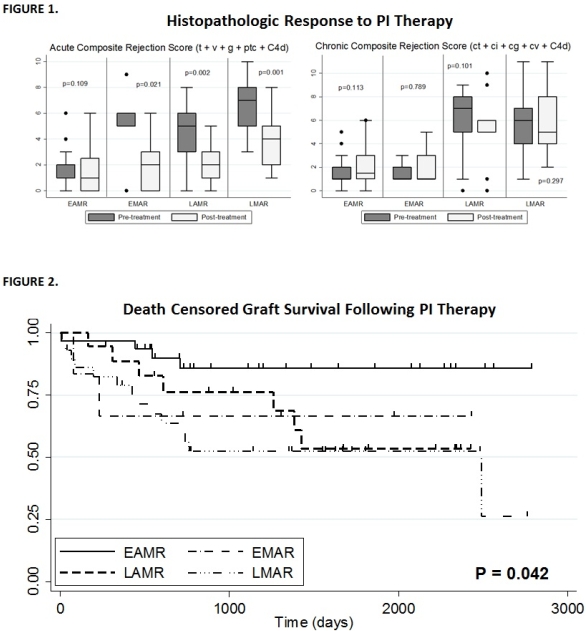Antibody Mediated Rejection and Mixed Acute Rejection: Long Term Results and Predictive Factors for Graft Loss Following Proteasome Inhibitor Therapy.
1U of Cincinnati, Cincinnati
2The Christ Hospital, Cincinnati.
Meeting: 2016 American Transplant Congress
Abstract number: 410
Keywords: Biopsy, Graft failure, HLA antibodies, Rejection
Session Information
Session Name: Concurrent Session: Kidney AMR: Predicting the Patient at Risk
Session Type: Concurrent Session
Date: Tuesday, June 14, 2016
Session Time: 2:30pm-4:00pm
 Presentation Time: 3:30pm-3:42pm
Presentation Time: 3:30pm-3:42pm
Location: Ballroom B
Purpose: Proteasome inhibitor (PI) therapy has been increasingly used to treated antibody mediated rejection (AMR) and mixed acute rejection (MAR). The purpose of this study was to assess long-term results in a large experience with PI therapy for AMR and MAR. Specifically, therapeutic responses to PI therapy and risk factors for death censored graft loss (DCGL) were evaluated.
Methods: Renal transplant (RTx) recipients experiencing AMR or MAR from 1/2005 – 01/2014 treated with a PI-based regimen were assessed. The Banff AMR Working Group Criteria was utilized to diagnose AMR and Banff criteria was used to diagnose acute cellular rejection (ACR). MAR was defined as meeting both ACR and AMR criteria. Early AMR (EAMR) was defined as occurred < 6 months post-RTx. Wilcoxson matched-pair rank sum test, logrank, and univariate and multivariate Cox proportional hazards models were employed for analysis.
Results: Demographic data included predominantly Caucasian males with a mean age of 42.6 + 14.9 years (table 1). Subgroups were similar by gender, race, transplant type, cPRA, and immunosuppression. Results are presented in Table 1, Figure 1, and Figure 2.
Conclusions:PI therapy provided improvements in serum creatinine, Banff component scoring, and DSA levels. Graft survival varied based on acute rejection phenotype (EAMR, E MAR, LAMR, LMAR). Multivariate risk factors for DCGL demonstrated that transplant type, lymphodepleting induction, late rejection, presence of Class II DSA, and SCr > 3 mg/dL at diagnosis specifically influence DCGL risk.
 .
.
 .
.
CITATION INFORMATION: Lichvar A, Leino A, Tremblay S, Abu-Jawdeh B, Govil A, Mogilishetty G, Cardi M, Kremer J, Cuffy M, Paterno F, Shields A, Witte D, Alloway R, Woodle E. Antibody Mediated Rejection and Mixed Acute Rejection: Long Term Results and Predictive Factors for Graft Loss Following Proteasome Inhibitor Therapy. Am J Transplant. 2016;16 (suppl 3).
To cite this abstract in AMA style:
Lichvar A, Leino A, Tremblay S, Abu-Jawdeh B, Govil A, Mogilishetty G, Cardi M, Kremer J, Cuffy M, Paterno F, Shields A, Witte D, Alloway R, Woodle E. Antibody Mediated Rejection and Mixed Acute Rejection: Long Term Results and Predictive Factors for Graft Loss Following Proteasome Inhibitor Therapy. [abstract]. Am J Transplant. 2016; 16 (suppl 3). https://atcmeetingabstracts.com/abstract/antibody-mediated-rejection-and-mixed-acute-rejection-long-term-results-and-predictive-factors-for-graft-loss-following-proteasome-inhibitor-therapy/. Accessed February 17, 2026.« Back to 2016 American Transplant Congress
